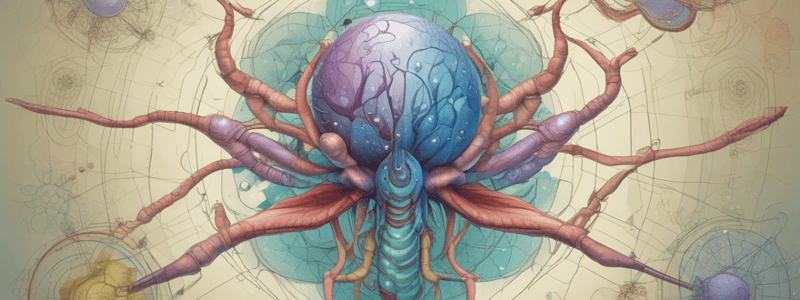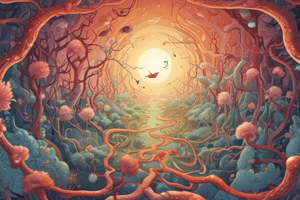Podcast
Questions and Answers
What is the scientific study of life and living organisms?
What is the scientific study of life and living organisms?
- Biology (correct)
- Geology
- Chemistry
- Physics
What branch of biology studies the interactions between organisms and their environment?
What branch of biology studies the interactions between organisms and their environment?
- Botany
- Genetics
- Zoology
- Ecology (correct)
What is the basic structural and functional unit of life?
What is the basic structural and functional unit of life?
- Molecule
- Tissue
- Cell (correct)
- Organ
What is the process by which plants convert light energy into chemical energy?
What is the process by which plants convert light energy into chemical energy?
What is the study of heredity, genes, and genetic variation?
What is the study of heredity, genes, and genetic variation?
What is the group of organs that work together to perform a specific function?
What is the group of organs that work together to perform a specific function?
What is the study of microorganisms, such as bacteria, viruses, and protists?
What is the study of microorganisms, such as bacteria, viruses, and protists?
What is the term for all living things on Earth?
What is the term for all living things on Earth?
Flashcards are hidden until you start studying
Study Notes
Definition and Scope
- Biology is the scientific study of life and living organisms
- Examines structure, function, growth, evolution, distribution, and taxonomy of all living things
- Includes diverse fields such as botany, zoology, microbiology, ecology, and genetics
Branches of Biology
- Botany: study of plants, including their structure, growth, evolution, classification, and distribution
- Zoology: study of animals, including their structure, behavior, evolution, classification, and distribution
- Microbiology: study of microorganisms, such as bacteria, viruses, and protists
- Ecology: study of interactions between organisms and their environment
- Genetics: study of heredity, genes, and genetic variation
- Biochemistry: study of chemical processes and compounds that occur within living organisms
- Molecular Biology: study of biological processes at the molecular level
Levels of Organization
- Molecule: basic building blocks of life, such as carbohydrates, proteins, and nucleic acids
- Cell: basic structural and functional unit of life
- Tissue: group of similar cells that perform a specific function
- Organ: structure composed of two or more types of tissues that work together
- Organ System: group of organs that work together to perform a specific function
- Organism: individual living thing, such as an animal, plant, or microbe
- Population: group of individuals of the same species living in a specific area
- Community: group of different species living in a specific area
- Ecosystem: community of living and non-living components interacting in a specific area
- Biosphere: all living things on Earth
Biological Processes
- Metabolism: chemical reactions that occur within cells to maintain life
- Photosynthesis: process by which plants convert light energy into chemical energy
- Respiration: process by which cells generate energy from glucose
- Cell Division: process by which cells reproduce and grow
- Homeostasis: ability of an organism to maintain a stable internal environment
- Evolution: change in the characteristics of a species over time through genetic variation and natural selection
Definition and Scope
- Biology is the scientific study of life and living organisms, examining structure, function, growth, evolution, distribution, and taxonomy of all living things.
- It includes diverse fields such as botany, zoology, microbiology, ecology, and genetics.
Branches of Biology
- Botany is the study of plants, including their structure, growth, evolution, classification, and distribution.
- Zoology is the study of animals, including their structure, behavior, evolution, classification, and distribution.
- Microbiology is the study of microorganisms, such as bacteria, viruses, and protists.
- Ecology is the study of interactions between organisms and their environment.
- Genetics is the study of heredity, genes, and genetic variation.
- Biochemistry is the study of chemical processes and compounds that occur within living organisms.
- Molecular Biology is the study of biological processes at the molecular level.
Levels of Organization
- Molecules are the basic building blocks of life, including carbohydrates, proteins, and nucleic acids.
- Cells are the basic structural and functional units of life.
- Tissues are groups of similar cells that perform a specific function.
- Organs are structures composed of two or more types of tissues that work together.
- Organ Systems are groups of organs that work together to perform a specific function.
- Organisms are individual living things, such as animals, plants, or microbes.
- Populations are groups of individuals of the same species living in a specific area.
- Communities are groups of different species living in a specific area.
- Ecosystems are communities of living and non-living components interacting in a specific area.
- The Biosphere includes all living things on Earth.
Biological Processes
- Metabolism involves chemical reactions that occur within cells to maintain life.
- Photosynthesis is the process by which plants convert light energy into chemical energy.
- Respiration is the process by which cells generate energy from glucose.
- Cell Division is the process by which cells reproduce and grow.
- Homeostasis is the ability of an organism to maintain a stable internal environment.
- Evolution is the change in the characteristics of a species over time through genetic variation and natural selection.
Studying That Suits You
Use AI to generate personalized quizzes and flashcards to suit your learning preferences.




